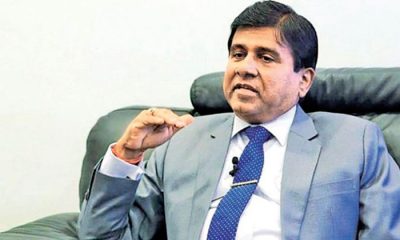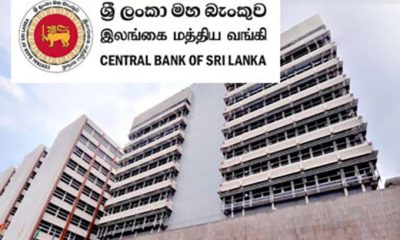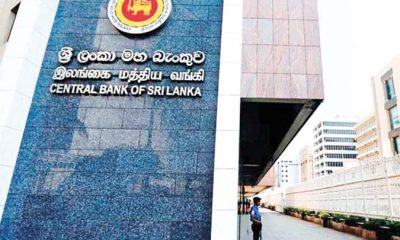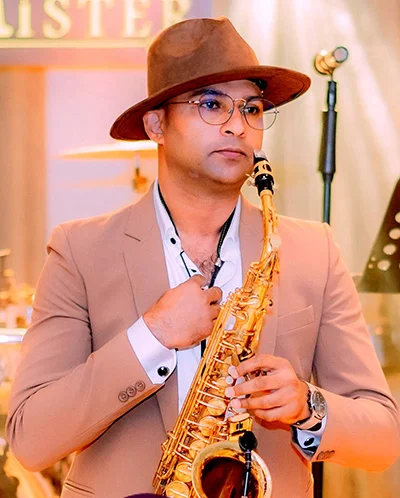Features
24-year-old collective agreement had to be honoured and precedents followed: CBSL Governor
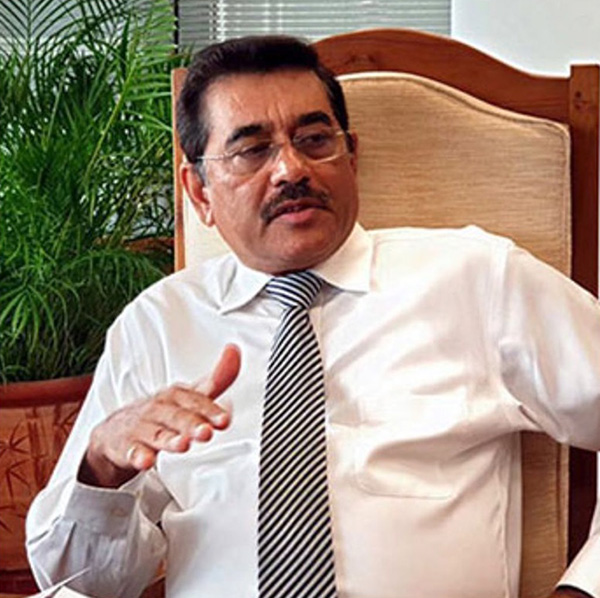
Pay hike controversy:
Public concerns won’t go unheeded
‘My pay hike is zero’
Governor’s salary lower than those of many others at CBSL
About 100 central bankers have left for overseas jobs since 2022
Newly-passed CBSL Act had nothing to do with triennial pay revision
by Saman Indrajith
The CBSL (Central Bank of Sri Lanka) pay hike controversy apparently refuses to go away. Hardly a day passes without it being taken up in Parliament or elsewhere. The person in the crosshairs of the critics of the CBSL in general and the pay revision in particular is CBSL Governor Dr. Nandalal Weerasinghe.
Has the CBSL departed from the established procedures, processes and practices in effecting the latest pay increases, which reportedly range from 29% to 70%? Do the Central Bankers deserve the salaries they are drawing? Is it fair for the CBSL minor staffers to be given higher salaries than some senior public officials? Has the CBSL Governor benefited from the controversial pay revision, and is he the highest paid Central Banker? How does he feel when some of his critics bay for his blood, in a manner of speaking?
Despite his hectic workload aggravated by numerous meetings on the IMF bailout programme and other economic recovery measures, Dr. Weerasinghe took time off his busy schedule, on Tuesday, to field the aforesaid questions and some more, in a brief interview with The Island.
Excerpts:
Q: How big is the pay hike you have got as the CBSL Governor from the recent salary revision?
A: My pay hike is zero. I have not received a pay hike from the recent salary revision, which only applies to CBSL employees up to the Deputy Governor level. My salary, as the Governor, is lower than those of many CBSL staff including some officials in lower grades. I have no complaints at all about my salary as I hold this position only due to my desire to help the economy recover from its worst crisis by using my experience and knowledge as a career central banker.
Q: But you are entitled to an attractive pension as CBSL Governor. aren’t you?
A. Although the previous CBSL administration made former Governors eligible for a pension irrespective of the length of their tenure, some of them have refused to claim their entitlement. I have also declared that I will not claim any pension benefits from CBSL for my tenure as Governor CBSL.
Q: However, you never had it so good, as your critics say. You now have an official house, official vehicles and other perks, don’t you?
A: I would not say I have never had it so good. Yes, I am entitled to an official residence, vehicle and some other perks like many other public servants. However, once such perks are added as non-cash benefits for taxation purposes, my take-home salary is significantly lower than my gross salary as caps imposed on non-cash benefits that are usually applied to the salaries of public servants are not applicable to the Governor’s salary.
Q: If you think your position as CBSL Governor is not financially rewarding, why did you return from retirement?
A: After my retirement, I moved to Australia with the intention of spending more time with my family as I could not spend quality time with them during the three decades of my career at CBSL. When I was asked whether I could come back and help the country at its darkest hour, I felt a moral obligation to accept the position, despite knowing that it would be detrimental to my family and financial position, when compared to my earning potential as an independent professional. I believe that any loyal countryman would have made the same decision at that time, given the severity of the situation.
Q: It is being argued in some quarters that the CBSL has been able to grant its employees pay hikes arbitrarily because of the newly-passed CBSL Act, which is believed to have given the CBSL unbridled independence. Isn’t it true?
A: The new CBSL Act has nothing to do with the recent salary revision. Since the establishment of CBSL under the provisions of previous law (Monetary Law Act of 1950) salary revisions have been done by the Board of CBSL. Since 1991, such revisions have been done once every three years. Collective agreements have been used to formalize such revisions since 2000, similar to many other public corporations and private sector entities.
Q: Who decided on the salary revision at issue?
A: In the process of collective agreements, salary revisions are decided based on several rounds of intense negotiations between all trade unions and management with the intention to reach a consensus among all parties. Some trade unions are directly affiliated to the existing major political parties while others are independent, representing only the interests of CBSL employees.
Q: If so, why are you drawing all the flak? And, why don’t you tell the public that you alone cannot be held responsible for that?
A: I believe this news has affected different groups of people in different ways. Some people feel very strongly about it. In such circumstances, it is only natural that I have drawn their ire as the head of the institution and perhaps the most public facing entity of CBSL. My goal is to understand the genuine concerns raised by the dissatisfied groups and to restore trust in the CBSL, and therefore I do not think it is prudent for me to distance myself from the issue and deflect.
Q: If you had not returned to accept the post of CBSL Governor after retirement, and had chosen to work for an international organization after the mandatory cooling-off period, would you have earned more than the salary of the CBSL Governor? It is being claimed via social media that you would have had to settle for an ordinary job in Australia if you had not been called from retirement to head the CBSL. What have you got to say to this?
A: I didn’t have any intention to engage in any full-time job after my retirement from CBSL. At the same time, I didn’t want to waste my knowledge and experience which I gained over three decades. I enjoyed my retirement life by conducting my own research and assisting some multilateral organizations and international firms whenever they sought my expertise on a part-time basis while enjoying time with my family and finding more time to travel. In fact, my retirement life was much more financially rewarding than my career at CBSL even as a Deputy Governor.
Q: Don’t you think the blame for the current economic crisis should be apportioned to the CBSL as well? Isn’t it true that the CBSL failed to warn the government against an impending foreign currency reserves crisis?
A: It is clearly evident in the recent Supreme Court case on the economic crisis that the CBSL officials had warned the then Governors, the Monetary Board and the Ministry of Finance about the impending economic crisis but such warnings were ignored. CBSL officials cannot make public statements or report to the Parliament on their own without permission from the Governor or the Board, under confidentiality clauses in CBSL laws. Such provisions are necessary in CBSL laws to prevent highly market sensitive and confidential information being leaked. Therefore, the CBSL professional staff cannot be blamed for the current economic crisis.
Q: Why do you think the CBSL Executive Grade officers deserve the salaries they draw? Do you think they could earn more if they join the private sector or international institutions? And, how many of them have left CBSL in recent years for better prospects?
A: Only a limited number of university graduates with First Class or Second Class Upper, who score highest at a competitive examination held independently, join the CBSL as Executive Grade officers. They are the top candidates who would easily obtain employment elsewhere if the CBSL salary is not competitive. Once they reach mid-level, they are specially trained for central banking and their special skills give them a wider market reach. Between 2022 and 2024, 100 staff members left CBSL and found employment abroad.
Q: CBSL minor employees draw higher salaries than many senior public officials? Don’t you think this is unfair?
A: I admit that there exists such an anomaly, which has been a legacy issue for two reasons. First, many minor employees were recruited to CBSL between 2008 and 2010 without a rigorous competitive process. Secondly, once they are recruited, they cannot be left out in salary determination in collective agreements as they are also part of staff and members of trade unions.
Q: What have you got to say to those who are out for your scalp?
A: I would like to reassure the public that the recent pay rise planned at CBSL has been conducted in accordance with all proper legal avenues and in the same manner as all other pay rises at the CBSL over its history.
I also want to reassure the people that their concerns will not go unheeded, and I appreciate the voices being raised as we are determined to take this opportunity to review the way we do things. We acknowledge that these are very tough economic times for everybody and there have been ethical issues raised about the timing of these measures, etc. We hope to give these ethical issues the due consideration they deserve.
I believe in the hard-working people of the CBSL and the hard-working people of our nation. I hope that a day will dawn when every worker gets a wage that he or she is satisfied with, including at the institution under my purview and elsewhere.
Q: Don’t you feel hurt when you come under fire?
A: I would say ‘hurt’ is the wrong word to use in this instance. I do sometimes feel disappointed when my energy as well as attention is forced away from the main task that I hoped to achieve when I returned to CBSL. My intention is to work for the betterment of Sri Lanka and support the CBSL staff on that journey. This is why I have been able to make difficult decisions. This is also why I am always open to receiving feedback from genuinely concerned parties. It is, however, an unnecessary diversion of energy and time when it comes from more political and disingenuous quarters.
(The interviewer is Deputy Editor of The Island.)
Features
Digital transformation in the Global South
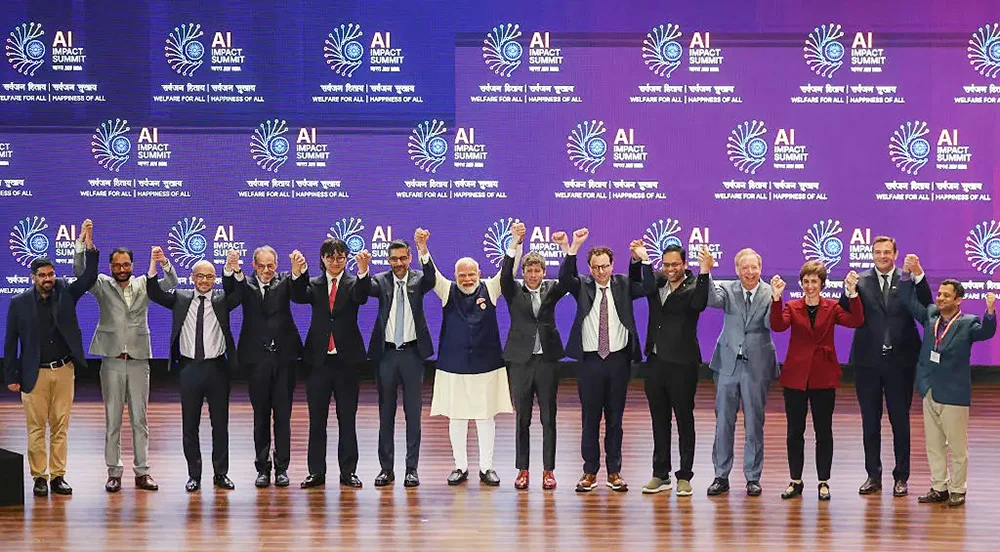
Understanding Sri Lanka through the India AI Impact Summit 2026
Artificial Intelligence (AI) has rapidly moved from being a specialised technological field into a major social force that shapes economies, cultures, governance, and everyday human life. The India AI Impact Summit 2026, held in New Delhi, symbolised a significant moment for the Global South, especially South Asia, because it demonstrated that artificial intelligence is no longer limited to advanced Western economies but can also become a development tool for emerging societies. The summit gathered governments, researchers, technology companies, and international organisations to discuss how AI can support social welfare, public services, and economic growth. Its central message was that artificial intelligence should be human centred and socially useful. Instead of focusing only on powerful computing systems, the summit emphasised affordable technologies, open collaboration, and ethical responsibility so that ordinary citizens can benefit from digital transformation. For South Asia, where large populations live in rural areas and resources are unevenly distributed, this idea is particularly important.
People friendly AI
One of the most important concepts promoted at the summit was the idea of “people friendly AI.” This means that artificial intelligence should be accessible, understandable, and helpful in daily activities. In South Asia, language diversity and economic inequality often prevent people from using advanced technology. Therefore, systems designed for local languages, and smartphones, play a crucial role. When a farmer can speak to a digital assistant in Sinhala, Tamil, or Hindi and receive advice about weather patterns or crop diseases, technology becomes practical rather than distant. Similarly, voice based interfaces allow elderly people and individuals with limited literacy to use digital services. Affordable mobile based AI tools reduce the digital divide between urban and rural populations. As a result, artificial intelligence stops being an elite instrument and becomes a social assistant that supports ordinary life.
Transformation in education sector
The influence of this transformation is visible in education. AI based learning platforms can analyse student performance and provide personalised lessons. Instead of all students following the same pace, weaker learners receive additional practice while advanced learners explore deeper material. Teachers are able to focus on mentoring and explanation rather than repetitive instruction. In many South Asian societies, including Sri Lanka, education has long depended on memorisation and private tuition classes. AI tutoring systems could reduce educational inequality by giving rural students access to learning resources, similar to those available in cities. A student who struggles with mathematics, for example, can practice step by step exercises automatically generated according to individual mistakes. This reduces pressure, improves confidence, and gradually changes the educational culture from rote learning toward understanding and problem solving.
Healthcare is another area where AI is becoming people friendly. Many rural communities face shortages of doctors and medical facilities. AI-assisted diagnostic tools can analyse symptoms, or medical images, and provide early warnings about diseases. Patients can receive preliminary advice through mobile applications, which helps them decide whether hospital visits are necessary. This reduces overcrowding in hospitals and saves travel costs. Public health authorities can also analyse large datasets to monitor disease outbreaks and allocate resources efficiently. In this way, artificial intelligence supports not only individual patients but also the entire health system.
Agriculture, which remains a primary livelihood for millions in South Asia, is also undergoing transformation. Farmers traditionally rely on seasonal experience, but climate change has made weather patterns unpredictable. AI systems that analyse rainfall data, soil conditions, and satellite images can predict crop performance and recommend irrigation schedules. Early detection of plant diseases prevents large-scale crop losses. For a small farmer, accurate information can mean the difference between profit and debt. Thus, AI directly influences economic stability at the household level.
Employment and communication reshaped
Artificial intelligence is also reshaping employment and communication. Routine clerical and repetitive tasks are increasingly automated, while demand grows for digital skills, such as data management, programming, and online services. Many young people in South Asia are beginning to participate in remote work, freelancing, and digital entrepreneurship. AI translation tools allow communication across languages, enabling businesses to reach international customers. Knowledge becomes more accessible because information can be summarised, translated, and explained instantly. This leads to a broader sociological shift: authority moves from tradition and hierarchy toward information and analytical reasoning. Individuals rely more on data when making decisions about education, finance, and career planning.
Impact on Sri Lanka
The impact on Sri Lanka is especially significant because the country shares many social and economic conditions with India and often adopts regional technological innovations. Sri Lanka has already begun integrating artificial intelligence into education, agriculture, and public administration. In schools and universities, AI learning tools may reduce the heavy dependence on private tuition and help students in rural districts receive equal academic support. In agriculture, predictive analytics can help farmers manage climate variability, improving productivity and food security. In public administration, digital systems can speed up document processing, licensing, and public service delivery. Smart transportation systems may reduce congestion in urban areas, saving time and fuel.
Economic opportunities are also expanding. Sri Lanka’s service based economy and IT outsourcing sector can benefit from increased global demand for digital skills. AI-assisted software development, data annotation, and online service platforms can create new employment pathways, especially for educated youth. Small and medium entrepreneurs can use AI tools to design products, manage finances, and market services internationally at low cost. In tourism, personalised digital assistants and recommendation systems can improve visitor experiences and help small businesses connect with travellers directly.
Digital inequality
However, the integration of artificial intelligence also raises serious concerns. Digital inequality may widen if only educated urban populations gain access to technological skills. Some routine jobs may disappear, requiring workers to retrain. There are also risks of misinformation, surveillance, and misuse of personal data. Ethical regulation and transparency are, therefore, essential. Governments must develop policies that protect privacy, ensure accountability, and encourage responsible innovation. Public awareness and digital literacy programmes are necessary so that citizens understand both the benefits and limitations of AI systems.
Beyond economics and services, AI is gradually influencing social relationships and cultural patterns. South Asian societies have traditionally relied on hierarchy and personal authority, but data-driven decision making changes this structure. Agricultural planning may depend on predictive models rather than ancestral practice, and educational evaluation may rely on learning analytics instead of examination rankings alone. This does not eliminate human judgment, but it alters its basis. Societies increasingly value analytical thinking, creativity, and adaptability. Educational systems must, therefore, move beyond memorisation toward critical thinking and interdisciplinary learning.
AI contribution to national development
In Sri Lanka, these changes may contribute to national development if implemented carefully. AI-supported financial monitoring can improve transparency and reduce corruption. Smart infrastructure systems can help manage transportation and urban planning. Communication technologies can support interaction among Sinhala, Tamil, and English speakers, promoting social inclusion in a multilingual society. Assistive technologies can improve accessibility for persons with disabilities, enabling broader participation in education and employment. These developments show that artificial intelligence is not merely a technological innovation but a social instrument capable of strengthening equality when guided by ethical policy.
Symbolic shift
Ultimately, the India AI Impact Summit 2026 represents a symbolic shift in the global technological landscape. It indicates that developing nations are beginning to shape the future of artificial intelligence according to their own social needs rather than passively importing technology. For South Asia and Sri Lanka, the challenge is not whether AI will arrive but how it will be used. If education systems prepare citizens, if governments establish responsible regulations, and if access remains inclusive, AI can become a partner in development rather than a source of inequality. The future will likely involve close collaboration between humans and intelligent systems, where machines assist decision making while human values guide outcomes. In this sense, artificial intelligence does not replace human society, but transforms it, offering Sri Lanka an opportunity to build a more knowledge based, efficient, and equitable social order in the decades ahead.
by Milinda Mayadunna
Features
Governance cannot be a postscript to economics
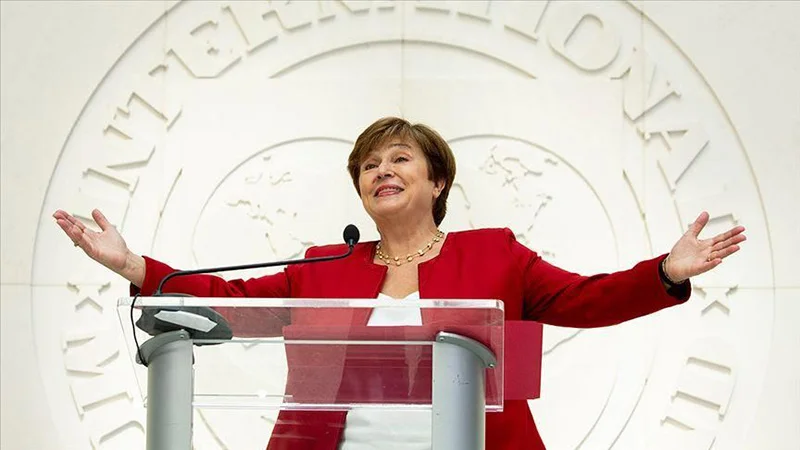
The visit by IMF Managing Director Kristalina Georgieva to Sri Lanka was widely described as a success for the government. She was fulsome in her praise of the country and its developmental potential. The grounds for this success and collaborative spirit go back to the inception of the agreement signed in March 2023 in the aftermath of Sri Lanka’s declaration of international bankruptcy. The IMF came in to fulfil its role as lender of last resort. The government of the day bit the bullet. It imposed unpopular policies on the people, most notably significant tax increases. At a moment when the country had run out of foreign exchange, defaulted on its debt, and faced shortages of fuel, medicine and food, the IMF programme restored a measure of confidence both within the country and internationally.
Since 1965 Sri Lanka has entered into agreements with the IMF on 16 occasions none of which were taken to their full term. The present agreement is the 17th agreement . IMF agreements have traditionally been focused on economic restructuring. Invariably the terms of agreement have been harsh on the people, with priority being given to ensure the debtor country pays its loans back to the IMF. Fiscal consolidation, tax increases, subsidy reductions and structural reforms have been the recurring features. The social and political costs have often been high. Governments have lost popularity and sometimes fallen before programmes were completed. The IMF has learned from experience across the world that macroeconomic reform without social protection can generate backlash, instability and policy reversals.
The experience of countries such as Greece, Ireland and Portugal in dealing with the IMF during the eurozone crisis demonstrated the political and social costs of austerity, even though those economies later stabilised and returned to growth. The evolution of IMF policies has ensured that there are two special features in the present agreement. The first is that the IMF has included a safety net of social welfare spending to mitigate the impact of the austerity measures on the poorest sections of the population. No country can hope to grow at 7 or 8 percent per annum when a third of its people are struggling to survive. Poverty alleviation measures in the Aswesuma programme, developed with the agreement of the IMF, are key to mitigating the worst impacts of the rising cost of living and limited opportunities for employment.
Governance Included
The second important feature of the IMF agreement is the inclusion of governance criteria to be implemented alongside the economic reforms. It goes to the heart of why Sri Lanka has had to return to the IMF repeatedly. Economic mismanagement did not take place in a vacuum. It was enabled by weak institutions, politicised decision making, non-transparent procurement, and the erosion of checks and balances. In its economic reform process, the IMF has included an assessment of governance related issues to accompany the economic restructuring process. At the top of this list is tackling the problem of corruption by means of publicising contracts, ensuring open solicitation of tenders, and strengthening financial accountability mechanisms.
The IMF also encouraged a civil society diagnostic study and engaged with civil society organisations regularly. The civil society analysis of governance issues which was promoted by Verite Research and facilitated by Transparency International was wider in scope than those identified in the IMF’s own diagnostic. It pointed to systemic weaknesses that go beyond narrow fiscal concerns. The civil society diagnostic study included issues of social justice such as the inequitable impact of targeting EPF and ETF funds of workers for restructuring and the need to repeal abuse prone laws such as the Prevention of Terrorism Act and the Online Safety Act. When workers see their retirement savings restructured without adequate consultation, confidence in policy making erodes. When laws are perceived to be instruments of arbitrary power, social cohesion weakens.
During a meeting between the IMF Managing Director Georgeiva and civil society members last week, there was discussion on the implementation of those governance measures in which she spoke in a manner that was not alien to the civil society representatives. Significantly, the civil society diagnostic report also referred to the ethnic conflict and the breakdown of interethnic relations that led to three decades of deadly war, causing severe economic losses to the country. This was also discussed at the meeting. Governance is not only about accounting standards and procurement rules. It is about social justice, equality before the law, and political representation. On this issue the government has more to do. Ethnic and religious minorities find themselves inadequately represented in high level government committees. The provincial council system that ensured ethnic and minority representation at the provincial level continues to be in abeyance.
Beyond IMF
The significance of addressing governance issues is not only relevant to the IMF agreement. It is also important in accessing tariff concessions from the European Union. The GSP Plus tariff concession given by the EU enables Sri Lankan exports to be sold at lower prices and win markets in Europe. For an export dependent economy, this is critical. Loss of such concessions would directly affect employment in key sectors such as apparel. The government needs to address longstanding EU concerns about the protection of human rights and labour rights in the country. The EU has, for several years, linked the continuation of GSP Plus to compliance with international conventions. This includes the condition that the Prevention of Terrorism Act (PTA) be brought into line with international standards. The government’s alternative in the form of the draft Protection of the State from Terrorism Act (PTSA) is less abusive on paper but is wider in scope and retains the core features of the PTA.
Governance and social justice factors cannot be ignored or downplayed in the pursuit of economic development. If Sri Lanka is to break out of its cycle of crisis and bailout, it must internalise the fact that good governance which promotes social justice and more fairly distributes the costs and fruits of development is the foundation on which durable economic growth is built. Without it, stabilisation will remain fragile, poverty will remain high, and the promise of 7 to 8 percent growth will remain elusive. The implementation of governance reforms will also have a positive effect through the creative mechanism of governance linked bonds, an innovation of the present IMF agreement.
The Sri Lankan think tank Verité Research played an important role in the development of governance linked bonds. They reduce the rate of interest payable by the government on outstanding debt on the basis that better governance leads to a reduction in risk for those who have lent their money to Sri Lanka. This is a direct financial reward for governance reform. The present IMF programme offers an opportunity not only to stabilise the economy but to strengthen the institutions that underpin it. That opportunity needs to be taken. Without it, the country cannot attract investment, expand exports and move towards shared prosperity and to a 7-8 percent growth rate that can lift the country out of its debt trap.
by Jehan Perera
Features
MISTER Band … in the spotlight

 It’s a good sign, indeed, for the local scene, to see artistes, who have not been very much in the limelight, now making their presence felt, in a big way, and I’m glad to give them the publicity they deserve.
It’s a good sign, indeed, for the local scene, to see artistes, who have not been very much in the limelight, now making their presence felt, in a big way, and I’m glad to give them the publicity they deserve.
On 10th February we had Yellow Beatz in the spotlight and this week it’s MISTER Band.
This outfit is certainly not new to our scene; they have been around since 2012, under the leadership of Sithum Waidyarathne.
The seven energetic members who make up MISTER Band are:
Sithum Waidyarathne (leader/founder/saxophonist/guitarist and vocalist), Rangana Seram (bass guitarist), Vihanga Liyanage (vocalist), Ridmi Dissanayake (female vocalist), Nuwan Cristo (keyboardist/vocalist), Kasun Thennakoon (lead guitarist), and Nuwan Madushanka (drummer).
According to Sithum, their vision is to provide high quality entertainmen to those who engage their services.
“Thanks to our engaging performances and growing popularity, MISTER Band continues to be in high demand … at weddings, corporate events and dinner dances,” said Sithum.
They predominantly cover English and Sinhala music, as well as the most popular genres.
And the reviews that come their way, after a performance, are excellent, they say, and this is one of the bouquets they received:
It was a pleasure to have you at our wedding. Being avid music fans we wanted the best music, not just a big named band, and you guys acceded that expectations. Big thanks to Sithum for being very supportive, attentive and generous.
- Sithum Waidyarathne: Band leader and founder
- Ridmi Dissanayake: MISTER Band’s female vocalist
The best thing is the post feedback from all the guests. Normally we get mixed reviews but the whole crowd was impressed by you.
MISTER Band was one of our best choices for our wedding.
What is interesting is that for the past four consecutive years, this outfit has performed overseas, during New Year’s Eve, thereby taking their music to the international stage, as well.
The band has also produced a collection of original songs, with around six original tracks composed by the band leader, Sithum Waidyarathne, including ‘Suraganak Dutuwa,’ ‘Landuni,’ ‘Dili Dili Payana,’ ‘Hada Wedana,’ and ‘Nil Kandu Athare.’
Two more songs are set to be released this month: ‘Hitha Norida’ and ‘Premaye Hanguman.’
In addition to their original music, they have also created a strong online presence by performing and uploading over 50 cover songs and medleys to YouTube.
“We’re now planning to connect with an even wider audience by releasing more cover content very soon,” said Sithum, adding that they are also very active on social media, under the name Mister Band Official – on Facebook, Instagram, YouTube, and TikTok.
-

 Features3 days ago
Features3 days agoWhy does the state threaten Its people with yet another anti-terror law?
-

 Features3 days ago
Features3 days agoReconciliation, Mood of the Nation and the NPP Government
-

 Features3 days ago
Features3 days agoVictor Melder turns 90: Railwayman and bibliophile extraordinary
-

 Features2 days ago
Features2 days agoLOVEABLE BUT LETHAL: When four-legged stars remind us of a silent killer
-

 Features3 days ago
Features3 days agoVictor, the Friend of the Foreign Press
-

 Latest News4 days ago
Latest News4 days agoNew Zealand meet familiar opponents Pakistan at spin-friendly Premadasa
-

 Latest News4 days ago
Latest News4 days agoTariffs ruling is major blow to Trump’s second-term agenda
-

 Latest News4 days ago
Latest News4 days agoECB push back at Pakistan ‘shadow-ban’ reports ahead of Hundred auction








